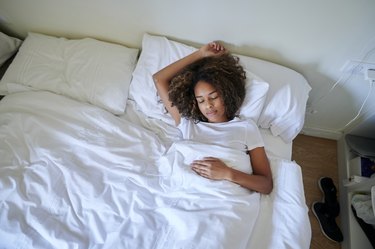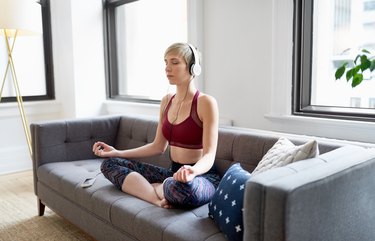
If you've ever had trouble falling asleep and searched for a solution, you've probably heard the call to shut off electronics before bed (i.e., stop scrolling), take a warm bath, turn on a white noise machine or practice light stretching before slipping into bed.
All these tips can be crucial parts of a relaxing nighttime routine to help you get better sleep.
Video of the Day
Video of the Day
Turns out, even sleep experts implement steps like these into their nighttime routines. While you don't have to copy their routines exactly, they can serve as a jumping off point to creating your own.
"Having a sleep hygiene routine that's customized to your own likes and needs not only adds enjoyment to your nighttime routine, but it also gives you something to look forward to at the end of the day," says Shelby Harris, PsyD, director of sleep health at Sleepopolis.
We asked Harris and other sleep experts to share their bedtime routines. Here's what they do to create a snooze-inducing environment.
1. They Pay Attention to What They Eat for Dinner
Health psychologist and stress and sleep specialist Julia Kogan, PsyD, tells LIVESTRONG.com that what she eats for dinner makes a big difference in her quality of sleep.
"I notice a lot of variability in my sleep based on what I'm eating," she says. For example, ordering carbohydrate-heavy takeout (with additives or ingredients she's not in control of) often keeps her up or leaves her with strange nightmares.
To ensure she sleeps soundly, Kogan eats a satisfying and balanced meal, but stays away from heavier, high-fat foods. "Heavier meals too close to bedtime can interfere with your ability to properly go through the sleep stages," she says.
Avoiding sugary foods (like chocolate), caffeine and alcohol before bed is also advised, per the Cleveland Clinic.
For dinner, Kogan fills half her plate with veggies, a quarter with complex carbs and the last quarter with protein. One example of a sleep-friendly dinner she enjoys is salmon, potatoes and salad.
2. They Try Not to Check Their Phone Right Before Sleep
Aim to put away electronic devices — including your phone — at least one hour before bed, according to the National Sleep Foundation (NSF).
"Screen time can be detrimental to sleep due to both the stimulating light and the stimulating content being viewed," says Joseph Dzierzewski, PhD, vice president in research and scientific affairs at the NSF.
If one hour seems too much at first, slowly work your way toward a goal that's realistic for you.
"I am working toward the goal of no electronics an hour before bed, but for now, I've implemented a rule of not checking email or social media within that timeframe," Dzierzewski says. That way, he can avoid potentially stressful or activating content from an email or social media post.
Similarly, Dzierzewski makes an effort to avoid all sources of light (especially blue light) as he sleeps.
"Strong evidence has demonstrated that even low levels of light can have a negative effect on sleep, and I have found this to be true for myself," he says.
And while he might set an alarm on his phone, the phone and charger stay out of reach, so there's no temptation to grab it for a quick check, he adds.
Tip
Other ways to limit light exposure before bed include hanging thick window curtains and avoiding all electronic light sources, except for maybe a sunrise alarm clock, which can be adjusted to your light, color and warmth preferences.
3. They Do Something Fun in the Evening
A sleep-promoting bedtime routine can actually start in the early evening, and include something you enjoy.
Raj Dasgupta, MD, associate professor of clinical medicine and spokesperson for the American Academy of Sleep Medicine, tells LIVESTRONG.com he does two things to set a relaxing tone for the evening: walk his dog and work on puzzles with his family.
That's right — when Dr. Dasgupta gets home around 6 p.m., he walks his Goldendoodle, Clifford. "Bonding with your pet may trigger the secretion of oxytocin — the trust or 'cuddle' hormone," he says. "This can reduce your levels of the stress hormone cortisol, which can cause insomnia."
After dinner, he works on a puzzle with his wife and kids. Doing things as a family as part of the bedtime routine is fun for everyone and creates a sense of calm.
Dr. Dasgupta says activities like this can give the body a little hit of dopamine, too, which rewards the brain and relaxes the body — a key to getting good sleep.
4. They Go Easy on Themselves When It Comes to Sleep
It's OK to put the day away, resist the temptation to get more done (aka productivity guilt) and relax. But if you sometimes feel keyed up at the thought of finally shutting your brain off for the day, you're not alone.
"If I am feeling anxious or wound up and not ready for sleep, I remind myself that it is good for me to rest and practice a non-striving, non-judgmental attitude about sleep," says Meredith Broderick, MD, founder of telehealth service Sound Sleep Guru in Washington.
In addition, if she doesn't feel sleepy at bedtime, "I try to determine why, and I may either stay up a bit later until that feeling passes or just go to bed and see what happens," she says.
Most times, she simply falls asleep. Other times, if she's still too anxious to sleep, she'll get out of bed for 10 to 15 minutes before snuggling back under the covers.
5. They Do a Quiet Wind-Down
Ideally, your nighttime routine lasts around one hour. But you can still make the most of it with less time. Whether Harris has one hour or 15 minutes, here's how she winds down:
- Apply skin-care products: "This is very calming and helps me unwind from the day," she says. Massaging skin-care products into your skin can also relax the muscles of the face, promoting relaxation.
- Practice light stretches for 10 minutes: These can be ones that are particularly soothing for you, or nighttime stretching exercises like child's pose, "legs up the wall" or corpse pose (savasana).
- Read a book or magazine: Preferably in dim light for five to 10 minutes.
- Set your phone to "do-not-disturb": And place it
outside the room.
"Doing these things nightly helps prepare my mind and body for sleep — and promote quality sleep," Harris says.
6. They Keep a Strict Bedtime (Within Reason!)
"I'm pretty rigid about my bedtime and wakeup time," says Wendy Troxel, PhD, a sleep specialist at the RAND Corporation and author of Sharing the Covers: Every Couple's Guide to Better Sleep.
Troxel sets her bedtime by counting back from when she has to wake up. So, because she wakes up at 6 a.m., she plans for eight hours in bed, which results in a 10 p.m. bedtime. "I try to keep it consistent in order to allow for an optimal duration of sleep on a nightly basis," she says.
And, if it's been a particularly difficult day, Troxel makes sure to watch something relaxing on TV in the early evening (nothing violent or psychologically distressing).
She also does deep breathing exercises or visual imagery if she's having trouble falling asleep — like recalling a memory that brings joy and comfort, or a nighttime affirmation to help get centered and ready for the night ahead.
And if you need help falling asleep, try out products for hot sleepers like cooling sheets or an eye mask.
What if You Share a Bed With a Partner?
If possible, try to go to bed at the same time, Troxel says. She and her husband use that time to cuddle and talk about their days. "It gives us an opportunity to connect and talk without distractions," she adds.
Is this an emergency? If you are experiencing serious medical symptoms, please see the National Library of Medicine’s list of signs you need emergency medical attention or call 911.





